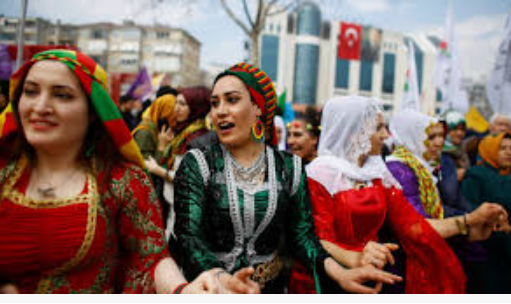Turkey’s President Erdoğan has commented on a possible new peace process with the Kurds, and said, “We are always ready to resolve issues through non-terrorist methods.” Erdoğan also signaled that a new constitution might be the solution to the issue, according to Duvar English.
Influential journalist Amberin Zaman had heralded the U-turn in Erdogan’s approach to Kurdish equality movement on Thursday in an article published by al Monitor: Amberin Zaman, known for her deep Kurdish and American sources, made an intriguing claim on the Al-Monitor news site.
According to her report, which she claims to have confirmed from three separate sources, Turkish government had facilitated a meeting between imprisoned founding leader of the outlawed Kurdish Worker’s Party (PKK), Abdullah Öcalan, and the current PKK leadership based in Iraq’s Qandil mountains, urging them to lay down their arms.
In essence, Al-Monitor’s sources suggest that this “process” had already begun even before Nationalist Movement Party (MHP) leader Devlet Bahçeli extended an olive branch to Kurdish-issue-focused People’s Democracy and Equality Party (DEM Party) members at the opening of the Turkish Grand National Assembly on October 1, stirring a debate in Türkiye.
Turkey’s President and the ruling Justice and Development Party (AKP) leader Recep Tayyip Erdoğan on Oct. 12 commented on a possible new peace process for the Kurdish issue, giving the first official hint that he and his nationalist ally Bahceli (MHP) are ready to deal with the representatives of the Kurdish rights movement in the parliament, DEM, formerly known as HDP.
During his return from Albania and Serbia, Erdoğan was asked about his and his ally MHP leader Devlet Bahçeli’s offers to reconcile with the pro-Kurdish Peoples’ Equality and Democracy (DEM) Party.
In a surprising move on Oct. 1, Bahçeli shook hands with DEM Party deputies at the opening session of the Parliament.
He later “invited” the DEM Party to “become a party of Turkey.” Previously, he called for the closure of the DEM Party on several occasions, accusing them of collaborating with the outlawed PKK.
On Oct. 12, Erdoğan said, “We find Mr. Bahçeli’s attitude positive and meaningful for our country’s struggle for democracy. We hope that the number of those who take these steps will increase in the future. As the number of those who take these steps increases, we hope that we can expand the base of social consensus on the new constitution.”
“In a geography surrounded by terrorist organizations, in a period of tensions in Iraq, civil war in Syria and Israel’s brutalization, it is important to establish peace at home,” Erdoğan said.
“We are always ready to resolve issues through non-terrorist methods. Because we do politics to strengthen the peace and unity of our country and to provide our nation with the quality services it deserves. This is also why we call for a new constitution. (We need) to make an inclusive, fair, civilian, and libertarian constitution,” he added.
Some critics said that Erdoğan might want to reconcile with the DEM Party for the preparation of a new constitution, so that he can run for the presidency once again as the constitution limits the presidency to two terms of five years.
Erdogan first approached main opposition party CHP to arrange an early election in 2027, which would also grant him eligibility for another term. Yet, CHP leader Ozgur Ozel set a deadline for early elections before the end of 2025, which is too early for the ongoing austerity program to achieve significant disinflation, which would likely bring back the large swathes of disenchanted voters. According to a majority of polls published since 31 March local elections, CHP is leading AKP by 3-4 points, while CHP’s presumptive candidates Ankara mayor Mansur Yavas and Istanbul mayor Ekrem Imamoglu poll significantly better than Erdogan.
The outlawed PKK launched its first attack in 1984 and the 1990s saw intense conflict between the PKK and Turkish Military especially in the country’s southeastern region. Erdoğan’s government started to take steps regarding the Kurdish question in 2009 and initiated a “peace process” between 2013–2015 with the armed organization.
Nonetheless, the peace process failed in 2015 and an intense armed conflict erupted in southeastern Turkey until 2016. Dozens of civilians died and many cities were demolished during the period.
Early to call it peace process but something’s developing, says DEM Party deputy Çandar. Other DEM reps talking to press unofficially, state they want good will signs from AKP, like release of their former leader Selahaddin Demirtas and access to imprisoned PKK leader Ocalan, who still has strong influence on Kurdish others and PKK leaders.
